Professional Year Program: ICT Ethics Case Study - James' Dilemma
VerifiedAdded on 2023/05/30
|7
|1195
|245
Case Study
AI Summary
This case study analyzes an ethical dilemma faced by James, an ICT consultant, contracted by a web design consultancy to assess staff knowledge for training purposes. James is instructed to keep individual information private. However, a senior Vice President requests the results, creating an ethical conflict. The analysis employs the McDonald framework, examining moral dimensions, interested parties, values, and potential courses of action. It explores the ACS Code of Ethics and Professional Conduct, as well as relevant Australian legislation (Privacy Act 1998). The study highlights the importance of professionalism, honesty, and professional development, and the potential consequences of violating ethical principles. The solution recommends that James should discuss the matter with his higher authority and take permission to share the results with senior Vice President. It concludes that James should not disclose the result with anyone.
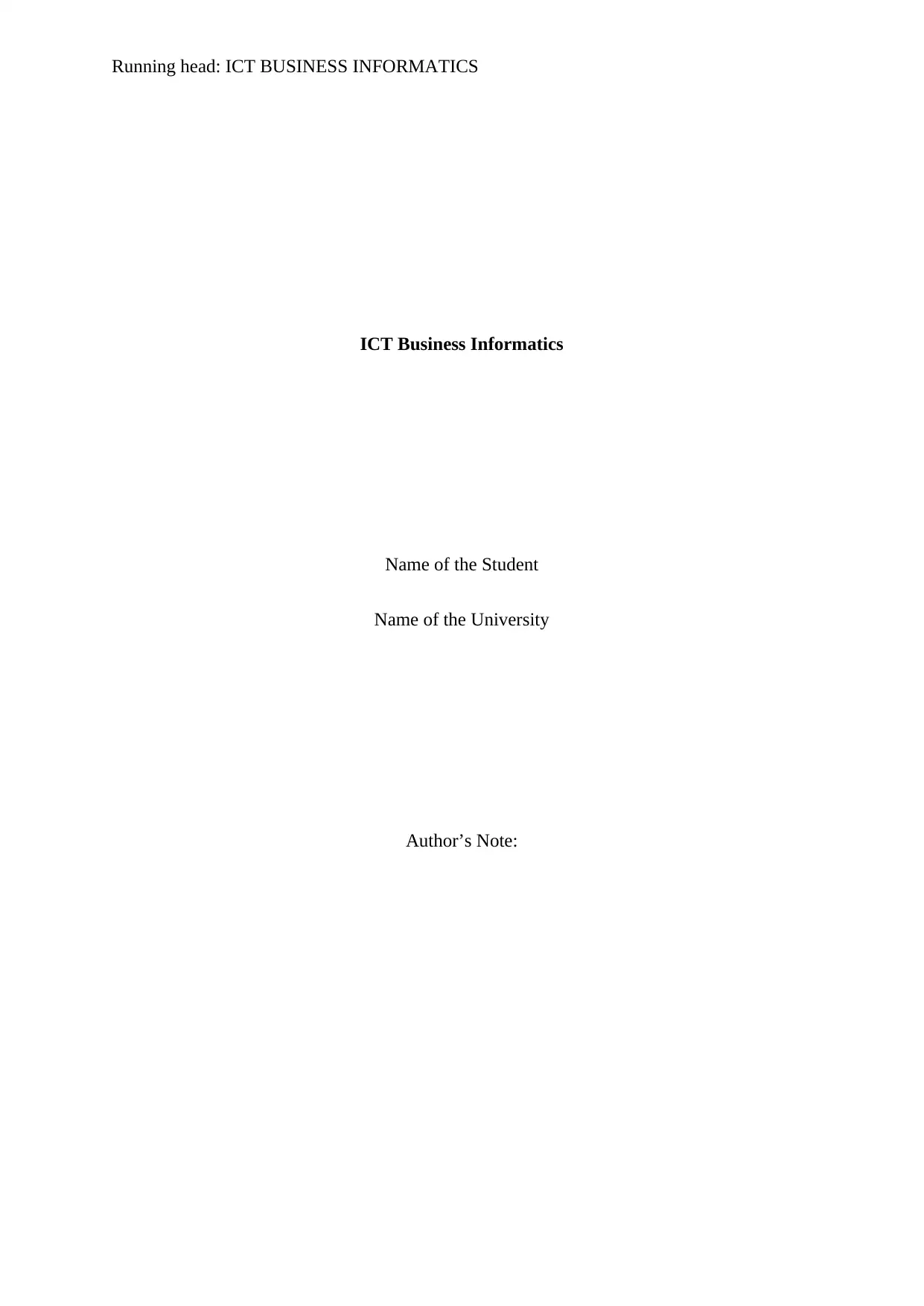
Running head: ICT BUSINESS INFORMATICS
ICT Business Informatics
Name of the Student
Name of the University
Author’s Note:
ICT Business Informatics
Name of the Student
Name of the University
Author’s Note:
Paraphrase This Document
Need a fresh take? Get an instant paraphrase of this document with our AI Paraphraser
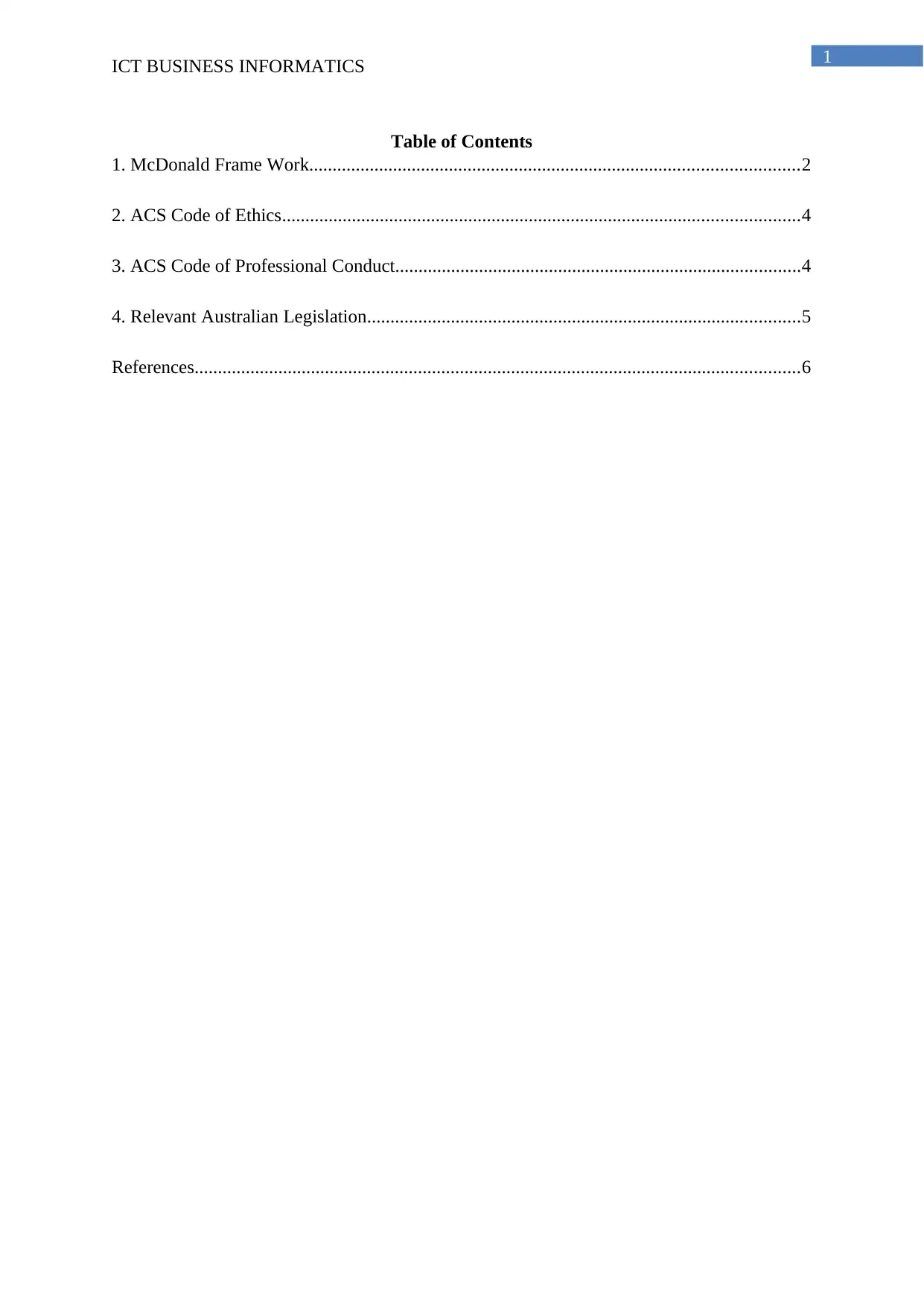
1
ICT BUSINESS INFORMATICS
Table of Contents
1. McDonald Frame Work.........................................................................................................2
2. ACS Code of Ethics...............................................................................................................4
3. ACS Code of Professional Conduct.......................................................................................4
4. Relevant Australian Legislation.............................................................................................5
References..................................................................................................................................6
ICT BUSINESS INFORMATICS
Table of Contents
1. McDonald Frame Work.........................................................................................................2
2. ACS Code of Ethics...............................................................................................................4
3. ACS Code of Professional Conduct.......................................................................................4
4. Relevant Australian Legislation.............................................................................................5
References..................................................................................................................................6
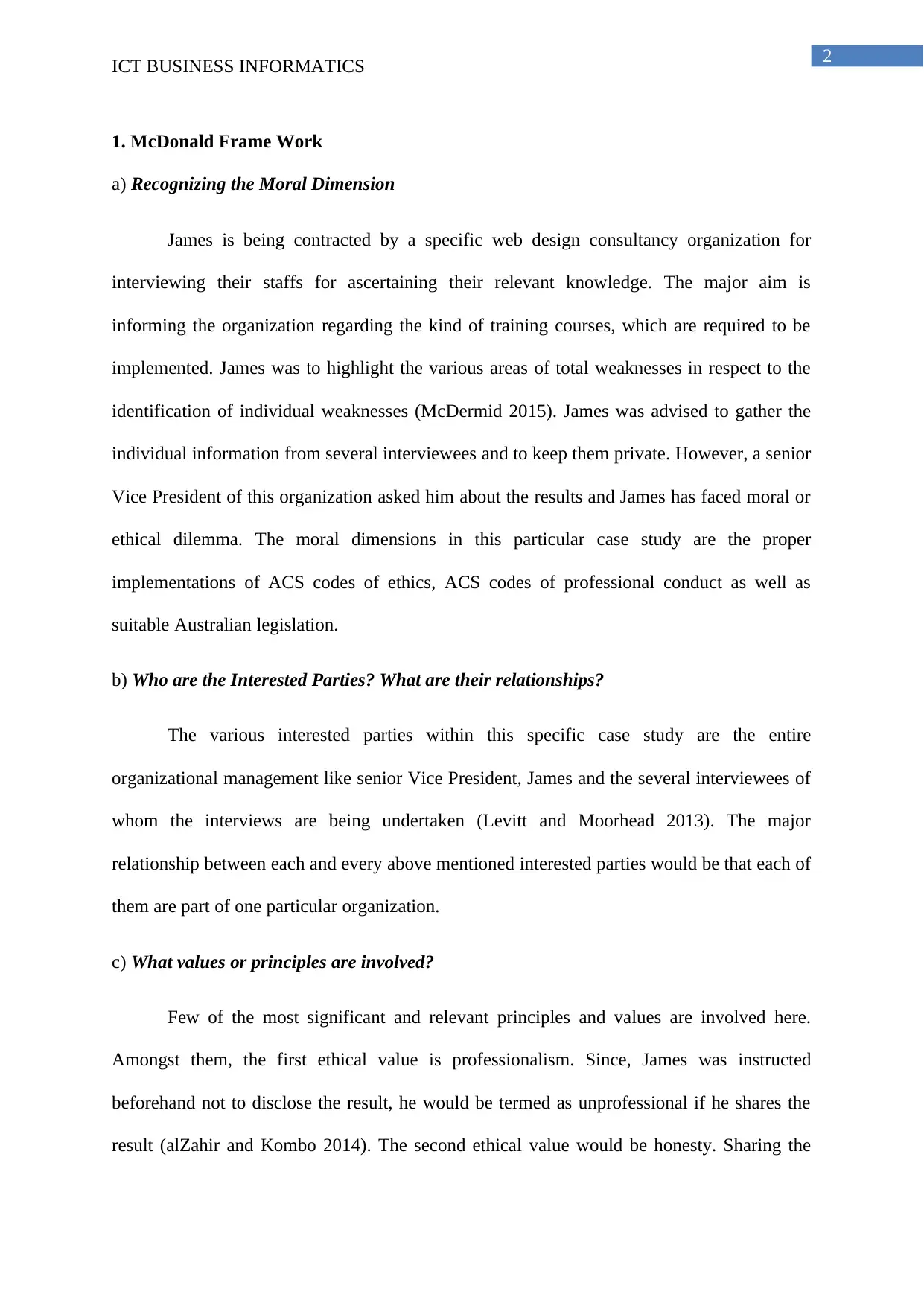
2
ICT BUSINESS INFORMATICS
1. McDonald Frame Work
a) Recognizing the Moral Dimension
James is being contracted by a specific web design consultancy organization for
interviewing their staffs for ascertaining their relevant knowledge. The major aim is
informing the organization regarding the kind of training courses, which are required to be
implemented. James was to highlight the various areas of total weaknesses in respect to the
identification of individual weaknesses (McDermid 2015). James was advised to gather the
individual information from several interviewees and to keep them private. However, a senior
Vice President of this organization asked him about the results and James has faced moral or
ethical dilemma. The moral dimensions in this particular case study are the proper
implementations of ACS codes of ethics, ACS codes of professional conduct as well as
suitable Australian legislation.
b) Who are the Interested Parties? What are their relationships?
The various interested parties within this specific case study are the entire
organizational management like senior Vice President, James and the several interviewees of
whom the interviews are being undertaken (Levitt and Moorhead 2013). The major
relationship between each and every above mentioned interested parties would be that each of
them are part of one particular organization.
c) What values or principles are involved?
Few of the most significant and relevant principles and values are involved here.
Amongst them, the first ethical value is professionalism. Since, James was instructed
beforehand not to disclose the result, he would be termed as unprofessional if he shares the
result (alZahir and Kombo 2014). The second ethical value would be honesty. Sharing the
ICT BUSINESS INFORMATICS
1. McDonald Frame Work
a) Recognizing the Moral Dimension
James is being contracted by a specific web design consultancy organization for
interviewing their staffs for ascertaining their relevant knowledge. The major aim is
informing the organization regarding the kind of training courses, which are required to be
implemented. James was to highlight the various areas of total weaknesses in respect to the
identification of individual weaknesses (McDermid 2015). James was advised to gather the
individual information from several interviewees and to keep them private. However, a senior
Vice President of this organization asked him about the results and James has faced moral or
ethical dilemma. The moral dimensions in this particular case study are the proper
implementations of ACS codes of ethics, ACS codes of professional conduct as well as
suitable Australian legislation.
b) Who are the Interested Parties? What are their relationships?
The various interested parties within this specific case study are the entire
organizational management like senior Vice President, James and the several interviewees of
whom the interviews are being undertaken (Levitt and Moorhead 2013). The major
relationship between each and every above mentioned interested parties would be that each of
them are part of one particular organization.
c) What values or principles are involved?
Few of the most significant and relevant principles and values are involved here.
Amongst them, the first ethical value is professionalism. Since, James was instructed
beforehand not to disclose the result, he would be termed as unprofessional if he shares the
result (alZahir and Kombo 2014). The second ethical value would be honesty. Sharing the
⊘ This is a preview!⊘
Do you want full access?
Subscribe today to unlock all pages.

Trusted by 1+ million students worldwide
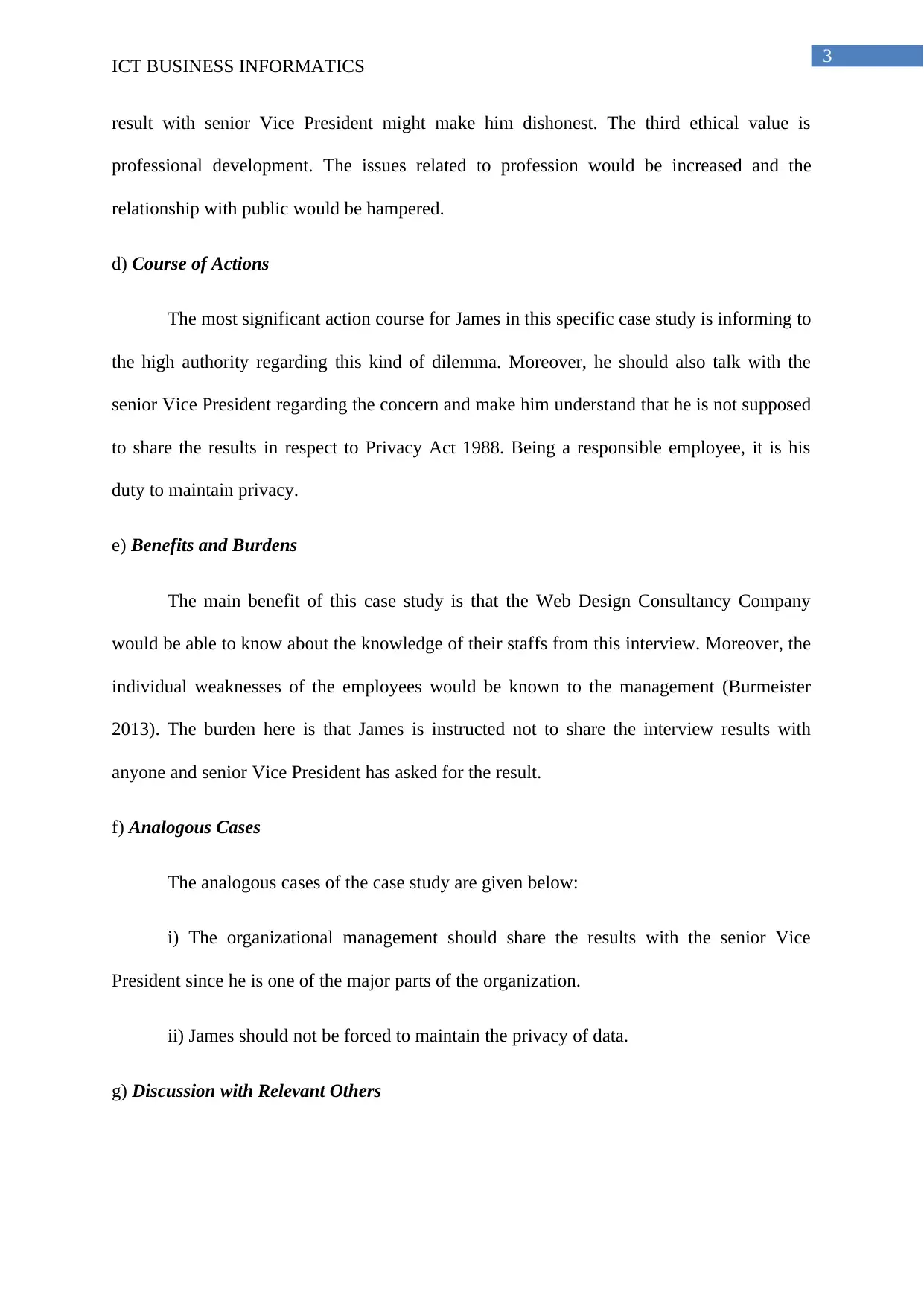
3
ICT BUSINESS INFORMATICS
result with senior Vice President might make him dishonest. The third ethical value is
professional development. The issues related to profession would be increased and the
relationship with public would be hampered.
d) Course of Actions
The most significant action course for James in this specific case study is informing to
the high authority regarding this kind of dilemma. Moreover, he should also talk with the
senior Vice President regarding the concern and make him understand that he is not supposed
to share the results in respect to Privacy Act 1988. Being a responsible employee, it is his
duty to maintain privacy.
e) Benefits and Burdens
The main benefit of this case study is that the Web Design Consultancy Company
would be able to know about the knowledge of their staffs from this interview. Moreover, the
individual weaknesses of the employees would be known to the management (Burmeister
2013). The burden here is that James is instructed not to share the interview results with
anyone and senior Vice President has asked for the result.
f) Analogous Cases
The analogous cases of the case study are given below:
i) The organizational management should share the results with the senior Vice
President since he is one of the major parts of the organization.
ii) James should not be forced to maintain the privacy of data.
g) Discussion with Relevant Others
ICT BUSINESS INFORMATICS
result with senior Vice President might make him dishonest. The third ethical value is
professional development. The issues related to profession would be increased and the
relationship with public would be hampered.
d) Course of Actions
The most significant action course for James in this specific case study is informing to
the high authority regarding this kind of dilemma. Moreover, he should also talk with the
senior Vice President regarding the concern and make him understand that he is not supposed
to share the results in respect to Privacy Act 1988. Being a responsible employee, it is his
duty to maintain privacy.
e) Benefits and Burdens
The main benefit of this case study is that the Web Design Consultancy Company
would be able to know about the knowledge of their staffs from this interview. Moreover, the
individual weaknesses of the employees would be known to the management (Burmeister
2013). The burden here is that James is instructed not to share the interview results with
anyone and senior Vice President has asked for the result.
f) Analogous Cases
The analogous cases of the case study are given below:
i) The organizational management should share the results with the senior Vice
President since he is one of the major parts of the organization.
ii) James should not be forced to maintain the privacy of data.
g) Discussion with Relevant Others
Paraphrase This Document
Need a fresh take? Get an instant paraphrase of this document with our AI Paraphraser
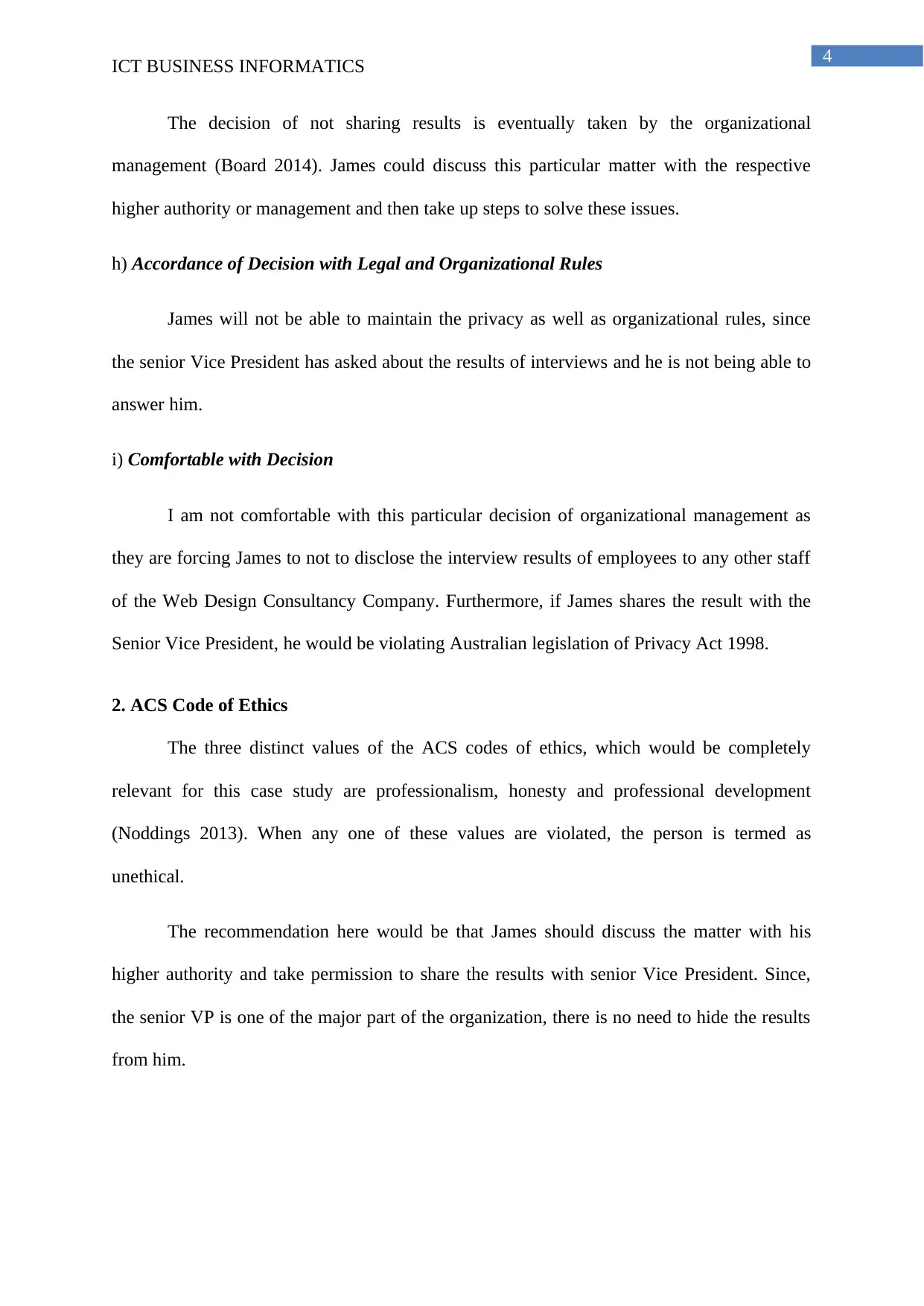
4
ICT BUSINESS INFORMATICS
The decision of not sharing results is eventually taken by the organizational
management (Board 2014). James could discuss this particular matter with the respective
higher authority or management and then take up steps to solve these issues.
h) Accordance of Decision with Legal and Organizational Rules
James will not be able to maintain the privacy as well as organizational rules, since
the senior Vice President has asked about the results of interviews and he is not being able to
answer him.
i) Comfortable with Decision
I am not comfortable with this particular decision of organizational management as
they are forcing James to not to disclose the interview results of employees to any other staff
of the Web Design Consultancy Company. Furthermore, if James shares the result with the
Senior Vice President, he would be violating Australian legislation of Privacy Act 1998.
2. ACS Code of Ethics
The three distinct values of the ACS codes of ethics, which would be completely
relevant for this case study are professionalism, honesty and professional development
(Noddings 2013). When any one of these values are violated, the person is termed as
unethical.
The recommendation here would be that James should discuss the matter with his
higher authority and take permission to share the results with senior Vice President. Since,
the senior VP is one of the major part of the organization, there is no need to hide the results
from him.
ICT BUSINESS INFORMATICS
The decision of not sharing results is eventually taken by the organizational
management (Board 2014). James could discuss this particular matter with the respective
higher authority or management and then take up steps to solve these issues.
h) Accordance of Decision with Legal and Organizational Rules
James will not be able to maintain the privacy as well as organizational rules, since
the senior Vice President has asked about the results of interviews and he is not being able to
answer him.
i) Comfortable with Decision
I am not comfortable with this particular decision of organizational management as
they are forcing James to not to disclose the interview results of employees to any other staff
of the Web Design Consultancy Company. Furthermore, if James shares the result with the
Senior Vice President, he would be violating Australian legislation of Privacy Act 1998.
2. ACS Code of Ethics
The three distinct values of the ACS codes of ethics, which would be completely
relevant for this case study are professionalism, honesty and professional development
(Noddings 2013). When any one of these values are violated, the person is termed as
unethical.
The recommendation here would be that James should discuss the matter with his
higher authority and take permission to share the results with senior Vice President. Since,
the senior VP is one of the major part of the organization, there is no need to hide the results
from him.

5
ICT BUSINESS INFORMATICS
3. ACS Code of Professional Conduct
The clauses for the three ACS codes of ethics are professionalism, honesty and
professional development.
For honesty, the clauses are distinguishing within the personal and professional
advices and opinions and qualifying the professional opinions on the basis of limited
knowledge and experience.
For professionalism, the clauses are taking appropriate actions against the individuals,
who are engaged in behaviours contrary to the value and taking informed, knowledgeable and
objective stances over the professional work effectively (Levitt and Moorhead 2013).
For professional development, the clauses are encouragement of employees for
continuing their professional development and supporting proper training regarding the
requirements.
4. Relevant Australian Legislation
The relevant Australian legislation that is suitable for this case study is Privacy Act
1998. James should not disclose the result with anyone.
ICT BUSINESS INFORMATICS
3. ACS Code of Professional Conduct
The clauses for the three ACS codes of ethics are professionalism, honesty and
professional development.
For honesty, the clauses are distinguishing within the personal and professional
advices and opinions and qualifying the professional opinions on the basis of limited
knowledge and experience.
For professionalism, the clauses are taking appropriate actions against the individuals,
who are engaged in behaviours contrary to the value and taking informed, knowledgeable and
objective stances over the professional work effectively (Levitt and Moorhead 2013).
For professional development, the clauses are encouragement of employees for
continuing their professional development and supporting proper training regarding the
requirements.
4. Relevant Australian Legislation
The relevant Australian legislation that is suitable for this case study is Privacy Act
1998. James should not disclose the result with anyone.
⊘ This is a preview!⊘
Do you want full access?
Subscribe today to unlock all pages.

Trusted by 1+ million students worldwide
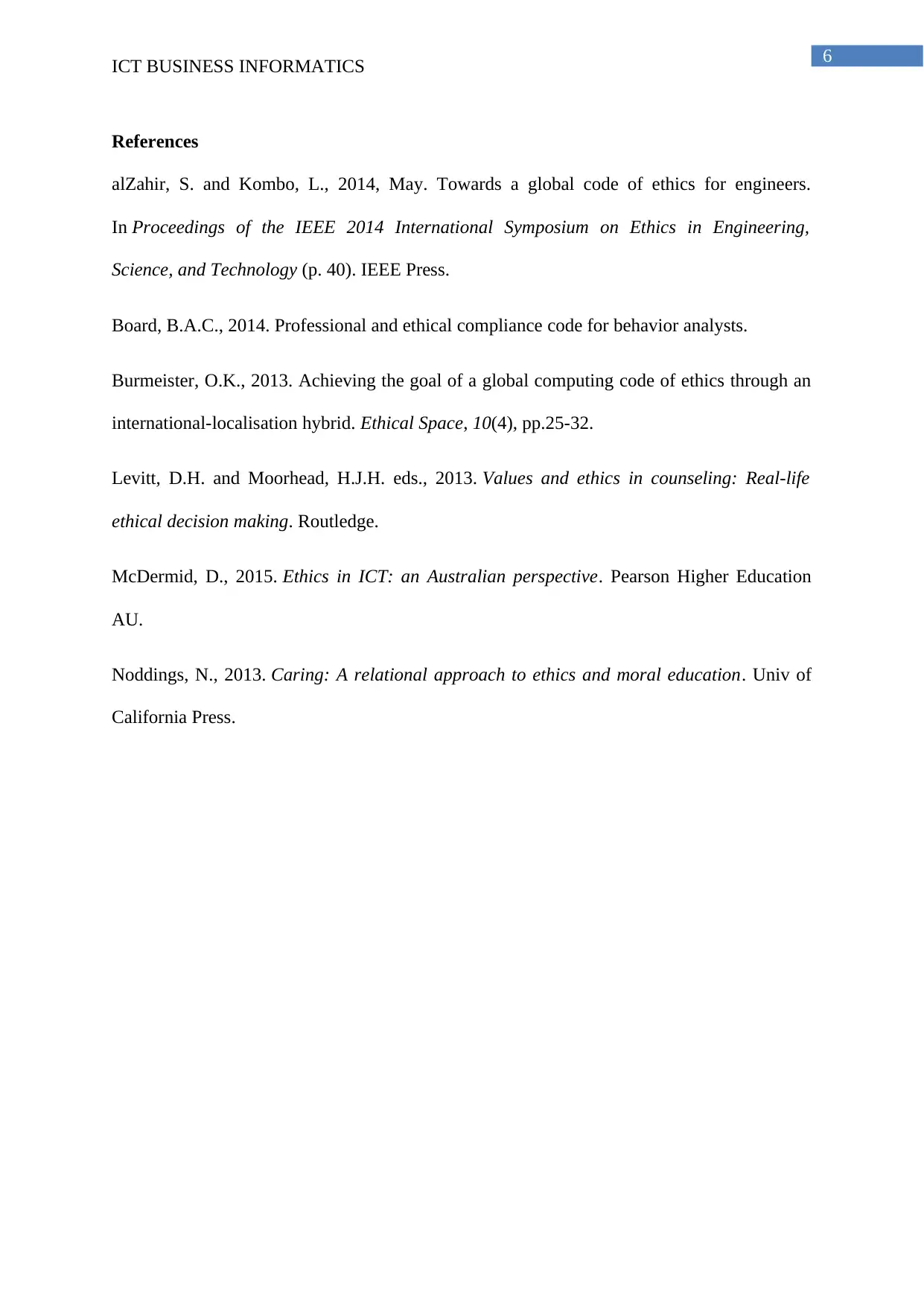
6
ICT BUSINESS INFORMATICS
References
alZahir, S. and Kombo, L., 2014, May. Towards a global code of ethics for engineers.
In Proceedings of the IEEE 2014 International Symposium on Ethics in Engineering,
Science, and Technology (p. 40). IEEE Press.
Board, B.A.C., 2014. Professional and ethical compliance code for behavior analysts.
Burmeister, O.K., 2013. Achieving the goal of a global computing code of ethics through an
international-localisation hybrid. Ethical Space, 10(4), pp.25-32.
Levitt, D.H. and Moorhead, H.J.H. eds., 2013. Values and ethics in counseling: Real-life
ethical decision making. Routledge.
McDermid, D., 2015. Ethics in ICT: an Australian perspective. Pearson Higher Education
AU.
Noddings, N., 2013. Caring: A relational approach to ethics and moral education. Univ of
California Press.
ICT BUSINESS INFORMATICS
References
alZahir, S. and Kombo, L., 2014, May. Towards a global code of ethics for engineers.
In Proceedings of the IEEE 2014 International Symposium on Ethics in Engineering,
Science, and Technology (p. 40). IEEE Press.
Board, B.A.C., 2014. Professional and ethical compliance code for behavior analysts.
Burmeister, O.K., 2013. Achieving the goal of a global computing code of ethics through an
international-localisation hybrid. Ethical Space, 10(4), pp.25-32.
Levitt, D.H. and Moorhead, H.J.H. eds., 2013. Values and ethics in counseling: Real-life
ethical decision making. Routledge.
McDermid, D., 2015. Ethics in ICT: an Australian perspective. Pearson Higher Education
AU.
Noddings, N., 2013. Caring: A relational approach to ethics and moral education. Univ of
California Press.
1 out of 7
Related Documents
Your All-in-One AI-Powered Toolkit for Academic Success.
+13062052269
info@desklib.com
Available 24*7 on WhatsApp / Email
![[object Object]](/_next/static/media/star-bottom.7253800d.svg)
Unlock your academic potential
Copyright © 2020–2026 A2Z Services. All Rights Reserved. Developed and managed by ZUCOL.





